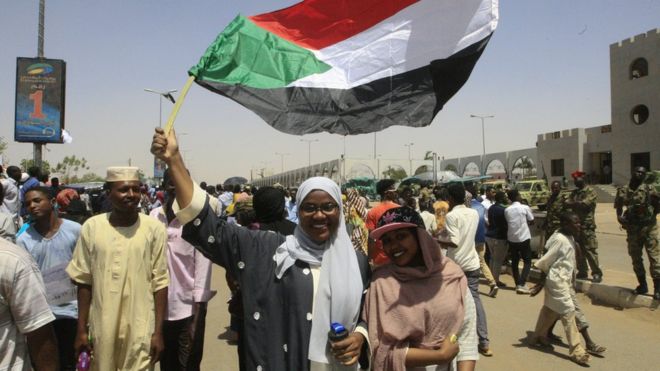African news : breaking news, features, analysis

Sudan arrests former government members
Sudan's transitional military council has arrested members of the former government and promised not to disperse protesters.
A spokesman also urged the opposition to pick the next prime minister and vowed to implement their choice.
Advertisement
Months of protests in Sudan led to the ousting and arrest of long-time leader Omar al-Bashir on Thursday.
Demonstrators have vowed to stay on the streets until there is an immediate move to civilian rule.
A sit-in is continuing outside the defence ministry in the capital Khartoum.
What did the military council say?
In a press conference on Sunday, spokesman Maj Gen Shams Ad-din Shanto said the military council was "ready to implement" whatever civilian government the opposition parties agreed.
"We won't appoint a PM. They'll choose one," he said, referring to opposition and protest groups.
He also said the army would not remove protesters from their sit-in by force, but called on protesters "to let normal life resume" and stop unauthorised roadblocks.
"Taking up arms will not be tolerated," he added.
The military council also announced a raft of decisions, including:
New heads of the army and the police
A new head of the powerful National Intelligence and Security Service (NISS)
Committees to fight corruption, and to investigate the former ruling party
The lifting of all media restrictions and censorship
The release of police and security officers detained for supporting protesters
A review of diplomatic missions, and the dismissal of Sudan's ambassadors to the US and to the UN in Geneva
What's been happening in Sudan?
Protests against a rise in the cost of living began in December but soon developed into a wider call for the removal of Mr Bashir and his government.
On Thursday the military removed and detained the veteran leader after nearly 30 years in power.
The coup leader, Defence Minister Awad Ibn Auf, announced the military would oversee a two-year transitional period followed by elections and imposed a three-month state of emergency.
But demonstrators vowed to stay in the streets regardless, demanding an immediate switch to civilian government.
Mr Ibn Auf himself stood down the next day, as did the feared security chief Gen Salah Gosh.
Lt Gen Abdel Fattah Abdelrahman Burhan was then named as head of the transitional military council, to become Sudan's third leader in as many days.



